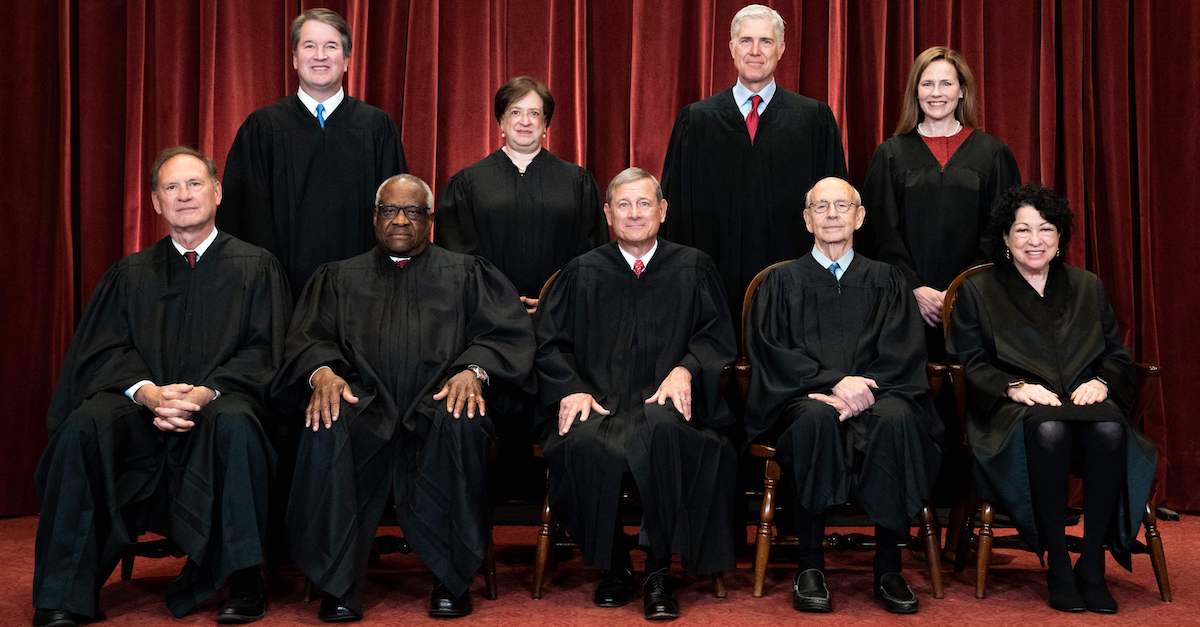
Seated from left: Associate Justice Samuel Alito, Associate Justice Clarence Thomas, Chief Justice John Roberts, Associate Justice Stephen Breyer and Associate Justice Sonia Sotomayor, standing from left: Associate Justice Brett Kavanaugh, Associate Justice Elena Kagan, Associate Justice Neil Gorsuch and Associate Justice Amy Coney Barrett pose during a group photo of the Justices at the Supreme Court in Washington, DC on April 23, 2021.
The last remaining abortion clinic in the state of Mississippi urged the Supreme Court of the United States on Monday not to undermine the court’s decades-old abortion rights precedents, warning the justices that “chaos would ensue” if the state were permitted to enforce its ban on the procedure after 15 weeks.
“The fallout would be swift and certain. As abortion bans are enforced—or the threat of enforcement looms—large swaths of the South and Midwest would likely be without access to legal abortion,” attorneys representing Jackson Women’s Health wrote in a newly filed brief. “Fear of arrest or prosecution could deter those who then need medical help from seeking it, endangering their health and safety.”
The case, Dobbs v. Jackson Women’s Health Organization, centers on a Mississippi law that bans most abortion procedures after the 15th week of pregnancy. State legislators attempted to institute the ban in 2018, but U.S. District Judge Carlton Reeves, a Barack Obama appointee, blocked the measure from taking effect. The U.S. Court of Appeals for the Fifth Circuit in 2019 upheld Reeves’s ruling, reasoning that the ban was a plain violation of Supreme Court precedent established in Roe and Planned Parenthood v. Casey.
Those cases establish that abortion is a “fundamental right” and that the government cannot place an “undue burden” on a woman’s ability to have the procedure before a fetus reaches viability.
But Mississippi Attorney General Lynn Fitch (R) in July then took the audacious step of asking the Supreme Court to do away with framework established by those landmark cases, calling both “egregiously wrong.”
“Under the Constitution, may a State prohibit elective abortions before viability? Yes. Why? Because nothing in constitutional text, structure, history, or tradition supports a right to abortion,” Mississippi’s attorneys wrote. “Roe and Casey are thus at odds with the straightforward, constitutionally grounded answer to the question presented. So the question becomes whether this Court should overrule those decisions. It should. The stare decisis case for overruling Roe and Casey is overwhelming.”
Dobbs had previously been delayed three times without much explanation, but following the confirmation of Amy Coney Barrett to the court, the justices in May formally agreed to hear to hear oral arguments in the coming term. The case could potentially have wide ranging implications on a women’s reproductive rights in Mississippi that reverberate throughout the U.S., and critics have voiced concern that the conservative majority on the bench may seize the opportunity to roll back landmark protections enshrined in Roe v. Wade and Casey v. Planned Parenthood.
According to the clinic’s attorneys, weakening established precedent and allowing the state to enforce its 15-week ban would cause far more harm than good to both the public’s health and perception of the court.
“People would be harmed, and chaos would ensue, even in states that claim not to be prohibiting abortion directly,” the clinic’s attorneys wrote. “Unless the court is to be perceived as representing nothing more than the preferences of its current membership, it is critical that judicial protection hold firm absent the most dramatic and unexpected changes in law or fact.”
In an ominous sign for abortion rights advocates, the justices earlier this month declined to grant injunctive relief in a matter on Texas law S.B. 8, which bans abortions after six weeks and creates a private cause of action against anyone who helps a woman get an abortion after a fetal heartbeat is detectable.
Oral arguments in the Dobbs case have not yet been scheduled.
Read the full brief below.
[image via ERIN SCHAFF/POOL/AFP via Getty Images]